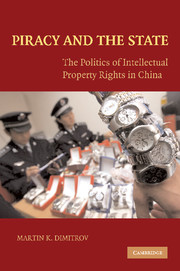Book contents
- Frontmatter
- Contents
- List of Tables
- List of Figures and GIS Maps
- Acknowledgments
- List of Abbreviations
- I INTRODUCTION
- II THE ORGANIZATION OF THE STATE: IPR ENFORCEMENT OPTIONS
- 3 Customs: Centralization without Rationalization
- 4 Courts: The Emergence of Rationalization
- 5 Administrative Enforcement: The Complex State
- 6 Criminal Enforcement: The Failure of Coordination
- III THE STATE IN ACTION: THE POLITICS OF IPR ENFORCEMENT IN CHINA
- IV CONCLUSION
- Glossary of Selected Chinese Terms
- Index
4 - Courts: The Emergence of Rationalization
Published online by Cambridge University Press: 06 November 2009
- Frontmatter
- Contents
- List of Tables
- List of Figures and GIS Maps
- Acknowledgments
- List of Abbreviations
- I INTRODUCTION
- II THE ORGANIZATION OF THE STATE: IPR ENFORCEMENT OPTIONS
- 3 Customs: Centralization without Rationalization
- 4 Courts: The Emergence of Rationalization
- 5 Administrative Enforcement: The Complex State
- 6 Criminal Enforcement: The Failure of Coordination
- III THE STATE IN ACTION: THE POLITICS OF IPR ENFORCEMENT IN CHINA
- IV CONCLUSION
- Glossary of Selected Chinese Terms
- Index
Summary
The previous chapter analyzed Customs enforcement as one facet of state capacity to protect IPR. The remaining chapters ofPart II describe the civil court, administrative, and criminal enforcement options available to right holders seeking to protect their IPR within China's borders. I start by examining the operation of a key enforcer that also holds the greatest promise for facilitating the emergence of a fully rationalized system of enforcement: the courts of law.
The common wisdom regarding the civil courts is that they matter in industrialized countries but are inconsequential in emerging-market economies such as China. Let us suppose that Proctor & Gamble has suffered from trademark counterfeiting and is now seeking redress. In the United States a layperson would immediately suppose that P&G should initiate a civil lawsuit in a court of law. Legal scholars working on IPR in developed countries similarly focus on the courts, more or less to the exclusion of other enforcement options. This orientation has been strengthened by the professional training offered in U.S. law schools, where courses on American and international intellectual property law rarely mention the possibility of nonjudicial redress through Customs, administrative agencies, or the police. But what should Proctor & Gamble do if the violation has happened in, say, China? In contrast to the shared optimism about the role of courts in developed countries, journalists and scholars alike hold a pessimistic view of the capacity or willingness of Chinese courts to offer redress.
- Type
- Chapter
- Information
- Piracy and the StateThe Politics of Intellectual Property Rights in China, pp. 95 - 114Publisher: Cambridge University PressPrint publication year: 2009

